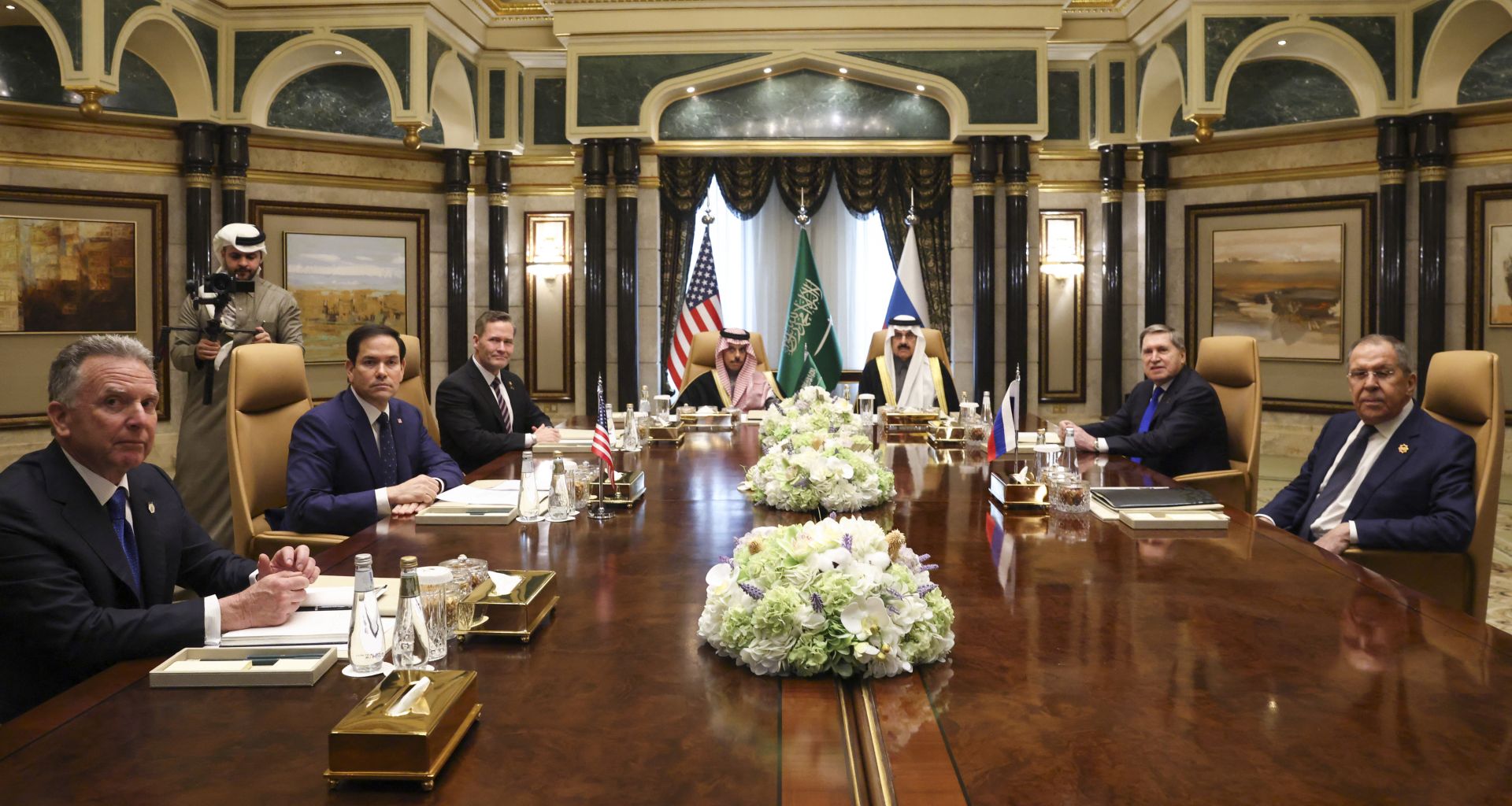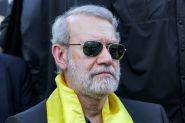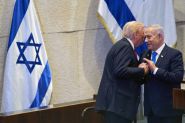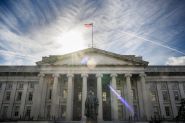- Home
- Middle East
- Russia Tells US It Opposes Any NATO Member Sending Troops to Ukraine

(L to R) US Middle East envoy Steve Witkoff, Secretary of State Marco Rubio, National Security Advisor Mike Waltz, Saudi Arabia's Foreign Minister Prince Faisal bin Farhan al-Saud, National Security Advisor Mosaad bin Mohammad al-Aiban, the Russian president's foreign policy advisor Yuri Ushakov, and Russia's Foreign Minister Sergei Lavrov attend a meeting together at Riyadh's Diriyah Palace on February 18, 2025. ©Evelyn Hockstein / POOL / AFP
Russia told the United States in talks on Tuesday that it opposed any NATO member sending troops to Ukraine as part of a ceasefire, Moscow's foreign minister said.
"The appearance of troops of armed forces from the same NATO countries, whether under a foreign flag, under the flag of the European Union or under national flags, does not change anything in this respect. This is unacceptable to us, of course," Sergei Lavrov told reporters following talks in Saudi Arabia.
Top US and Russian diplomats were meeting in Saudi Arabia for talks on resetting their fractured relations, the first such discussions since the Russian invasion of Ukraine.
Both sides downplayed expectations of a breakthrough in this first high-level meeting between the countries since US President Donald Trump took office.
Still, the very fact the encounter was taking place has triggered concern in Ukraine and Europe following the United States' recent overtures towards the Kremlin.
At Diriyah Palace in Riyadh, the talks began without visible handshakes, and no statements were made.
A stern-faced US Secretary of State Marco Rubio sat across from Russia's Foreign Minister Sergei Lavrov, with US National Security Advisor Mike Waltz and Middle East envoy Steve Witkoff by his side.
Lavrov was accompanied by senior Russian presidential aide Yuri Ushakov. Saudi Foreign Minister Prince Faisal bin Farhan and national security adviser Musaad bin Mohammad al-Aiban also attended.
Ukrainian President Volodymyr Zelensky said Kyiv was not invited to the discussions. European leaders met in Paris on Monday for emergency talks on how to respond to the radical pivot by the new Trump administration.
Preparations for a possible summit between Trump and Russian President Vladimir Putin are also expected to be on the agenda.
Trump is pushing for a swift resolution to the three-year conflict in Ukraine, while Russia sees his outreach as a chance to win concessions.
Zelensky said Kyiv "did not know anything about" the talks in Riyadh, according to Ukrainian news agencies, and that it "cannot recognise any things or any agreements about us without us".
As the Riyadh meeting got underway, the Kremlin said a lasting settlement in Ukraine would be "impossible" without addressing the wider issue of European security and that Ukraine had the "sovereign right" to join the European Union but that it was opposed to it joining NATO.
"A lasting and long-term viable resolution is impossible without a comprehensive consideration of security issues on the continent," Kremlin spokesman Dmitry Peskov said, adding Putin was ready to talk to Zelensky "if necessary".
In Beijing, Chinese foreign ministry spokesman Guo Jiakun welcomed "efforts towards peace" in Ukraine, adding that "at the same time, we hope that all parties and stakeholders can participate" in talks.
Russia said ahead of the meeting that Putin and Trump wanted to move on from "abnormal relations" and that it saw no place for Europeans to be at any negotiating table.
Possible Trump-Putin summit
Moscow's economic negotiator for talks with Washington, Kirill Dmitriev, told state TV on Tuesday that he expected "progress in the not so distant future, in the next two-three months".
"We have a series of proposals, which our colleagues are thinking about," said Dmitriev, head of the Russian Direct Investment Fund.
Peskov earlier told reporters the Riyadh talks would be "primarily devoted to restoring the whole complex of Russian-American relations", alongside discussions on "possible negotiations on a Ukrainian resolution, and organising a meeting between the two presidents".
Moscow, which for years has sought to roll back NATO's presence in Europe, has made clear it wants to hold bilateral talks with the United States on a plethora of broad security issues, not just a possible Ukraine ceasefire.
The prospects of any talks leading to an agreement to halt the Ukraine fighting are unclear.
Three years after Moscow invaded Ukraine in February 2022, both Russia and the United States have cast Tuesday's meeting as the beginning of a potentially lengthy process.
"I don't think that people should view this as something that is about details or moving forward in some kind of a negotiation," US State Department spokesperson Tammy Bruce said.
Russia's Ushakov told state media the talks would discuss "how to start negotiations on Ukraine."
Europe meeting 'not an option'
Both Ukraine and Russia have ruled out territorial concessions and Putin last year demanded Kyiv withdraw its troops from even more territory.
Zelensky was in Turkey on Tuesday for discussions on the conflict with President Recep Tayyip Erdogan. He is due in Saudi Arabia on Wednesday.
Zelensky said last week he was prepared to meet Putin, but only after Kyiv and its allies had a common position on ending the war.
As European leaders gathered in Paris for an emergency security summit, Russia's Lavrov said Monday he saw no point in them taking part in any Ukraine talks.
The significance of the talks taking place in Riyadh -- once a diplomatic pariah under the former US administration -- was not lost on analysts.
"Europe's the traditional meeting place for the Americans and the Russians, but that's not an option in the current environment," said James Dorsey of the National University of Singapore.
"You either go to Asia or you go to Saudi Arabia," he said.
With AFP
Read more



Comments